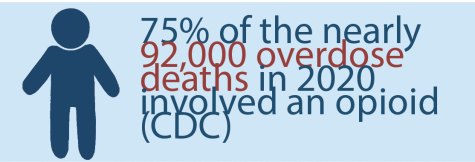How to get help
April 18, 2023
Fentanyl is highly addictive, but seeking medical help and emotional support can help combat substance abuse.
Nicole Hoffman, the clinical director at Roots Renewal Ranch, works with teen girls and their families to treat substance abuse. At the Ranch, the kids start their medical journey with a conversation with Hoffman and their parents. They offer group therapy, family therapy, and time with animals and crafts.
The goal of integrating these activities is to show the girls how to find hobbies and pleasure outside of substance abuse.
“If they’ve been using substances, they learned how to live this way,” Hoffman said. “Now we’ve got to learn how to do it without them.”
But while rehab can help people make immense progress, it is not always affordable. Clients usually stay around 90 days. Hoffman said the range for typical rehab facilities is between $800-$1300 a day. Insurance is helpful and payment plans are offered, but many people do not receive the help they need because they cannot afford it.
For teens and families who cannot afford rehab, Hoffman recommends having people in their life who are going to be supportive and help them get healthy. Specifically, Hoffman wants teens to turn to adults who they trust.
Addicts often refuse to admit that they don’t have control over their addiction and don’t accept help. Hoffman said people often manipulate themselves into thinking they can stop at any time.
“The real truth is that addiction lies to you, especially when we’re looking at something that’s highly addictive as fentanyl,” Hoffman said. “It only takes one time.”

The school counselors, assistant principals, and SRO work together to find students the help they need to fight their substance addictions. Most cases involving students and drugs are turned over to SRO Mike Anderson.
Anderson said most of these investigations start with the school’s tip line. He encourages students to use the tip line because it could save someone’s life, even if it is at the expense of being a “snitch.”
“Most of the time that high school students report somebody, it’s because there’s a genuine concern,” Anderson said. “I don’t really see it as snitching.”
The school district offers counseling programs and works with clinics in order to aid students. Anderson and the APs encourage students to prioritize their friends’ health and get them help with the resources available.
Chavez reiterates to students that the potential and long-term effects are not worth the temporary high.
“The threat is too strong,” Chavez said. “The consequences are too irreversible.”